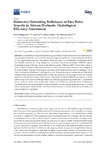Rainwater Harvesting Techniques to Face Water Scarcity in African Drylands: Hydrological Efficiency Assessment

Ver/
Use este enlace para citar
http://hdl.handle.net/2183/26667
A non ser que se indique outra cousa, a licenza do ítem descríbese como Atribución 4.0 Internacional
Coleccións
- Investigación (ETSECCP) [826]
Metadatos
Mostrar o rexistro completo do ítemTítulo
Rainwater Harvesting Techniques to Face Water Scarcity in African Drylands: Hydrological Efficiency AssessmentData
2020Cita bibliográfica
Tamagnone, P.; Cea, L.; Comino, E.; Rosso, M. Rainwater Harvesting Techniques to Face Water Scarcity in African Drylands: Hydrological Efficiency Assessment. Water 2020, 12, 2646. https://doi.org/10.3390/w12092646
Resumo
[Abstract] The sub-Saharan climate is experiencing a marked increase in temperature and intensification of precipitation intensity and variability. Besides, longer dry spells are compromising the reliability of local agricultural practices. The present study provides a comprehensive investigation about the benefits induced by using indigenous rainwater harvesting techniques (RWHT) against hydrometeorological threats affecting the Sahelian areas. Different RWHT have been tested in term of runoff retention, infiltration increase into the root zone, and soil water stress mitigation. To achieve these purposes, hydrological processes at the field scale have been investigated using a two-dimensional distributed hydrological model. To make the study representative of the whole Sahelian areas, several simulations were carried out adopting a wide range of input parameters based on conventional values of those areas. The results reveal that RWHT may lead to a runoff retention up to 87% and to double the infiltration. Intercepting and storing runoff, RWHT increase the water content in the root zone and the right design can diminish the crop water stress. Furthermore, the results show that adopting RWHT makes it possible to extend the growing season up to 20 days, enhancing the yield. These benefits contribute to the reduction of the climate-related water stress and the prevention of crop failure.
Palabras chave
Climate-smart agriculture
Sustainable land and water management
Rainwater harvesting techniques
Hydrological modelling
Water balance
Crop water stress
Sahel
Sustainable land and water management
Rainwater harvesting techniques
Hydrological modelling
Water balance
Crop water stress
Sahel
Versión do editor
Dereitos
Atribución 4.0 Internacional






